Introduction
Many companies are managed by directors who do not own the company. Many problems have arisen due to the separation of ownership and control .e.g. directors having inadequate skills to manage their area, or awarding themselves large bonuses whilst not meeting targets. Due to the many problems which have arisen in the past, corporate governance has been developed.
Company ownership and control
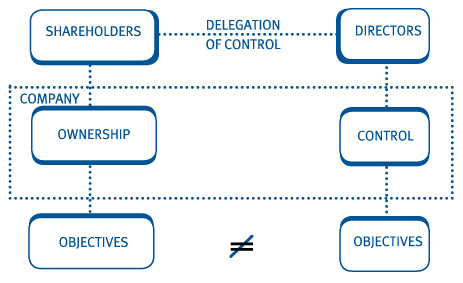
- A 'joint stock company' is a company which has issued shares.
- Since the formation of joint stock companies in the 19th century, they have become the dominant form of business organisation within the UK.
- Companies that are quoted on a stock market such as the London Stock Exchange are often extremely complex and require a substantial investment in equity to fund them, i.e. they often have large numbers of shareholders.
- Shareholders delegate control to professional managers (the board of directors) to run the company on their behalf. The board act as agents.
- Shareholders normally play a passive role in the day-to-day management of the company.
- Directors own less than 1% of the shares of most of the UK's 100 largest quoted companies and only four out of ten directors of listed companies own any shares in their business.
- Separation of ownership and control leads to a potential conflict of interests between directors and shareholders.
- This conflict is an example of the principal-agent relationship.
What is 'corporate governance'?
The Cadbury Report 1992 provides a useful definition:
- 'the system by which companies are directed and controlled'.
An expansion might include:
- 'in the interests of shareholders' highlighting the agency issue involved
- 'and in relation to those beyond the company boundaries' or
- 'and stakeholders' suggesting a much broader definition that brings in concerns over social responsibility.
To include these final elements is to recognise the need for organisations to be accountable to someone or something.
Governance could therefore be described as:
'the system by which companies are directed and controlled in the interests of shareholders and other stakeholders'.
Companies are directed and controlled from inside and outside the company. Good governance requires the following to be considered:
Direction from within:
- the nature and structure of those who set direction, the board of directors
- the need to monitor major forces through risk analysis
- the need to control operations: internal control.
Control from outside:
- the need to be knowledgeable about the regulatory framework that defines codes of best practice, compliance and legal statute
- the wider view of corporate position in the world through social responsibility and ethical decisions.
The business case for governance
Providing a business case for governance is important in order to enlist management support. Corporate governance is claimed to bring the following benefits:
- It is suggested that strengthening the control structure of a business increases accountability of management and maximises sustainable wealth creation.
- Institutional investors believe that better financial performance is achieved through better management, and better managers pay attention to governance, hence the company is more attractive to such investors.
- The above points may cause the share price to rise - which can be referred to as the "governance dividend" (i.e. the benefit that shareholders receive from good corporate governance).
- Additionally, a socially responsible company may be more attractive to customers and investors hence revenues and share price may rise (a "social responsibility dividend").
The hard point to prove is how far this business case extends and what the returns actually are.
Purpose and objectives of corporate governance
The basic purpose of corporate governance is to monitor those parties within a company which control the resources owned by investors.
- The primary objective of sound corporate governance is to contribute to improved corporate performance and accountability in creating long-term shareholder value.
Key concepts
The foundation to governance is the action of the individual. These actions are guided by a person's moral stance.
Characteristics which are important in the development of an appropriate moral stance include the following:
Fairness
- A sense of equality in dealing with internal stakeholders.
- A sense of even-handedness in dealing with external stakeholders.
- An ability to reach an equitable judgement in a given ethical situation.
Openness/transparency
- The creation of a transparent relationship with shareholders to reduce agency costs (see later in this chapter), and the development of accounting systems and standards to facilitate this openness.
- Lack of withholding relevant information unless necessary, leading to a default position of information provision (rather than concealment).
- Transparency in strategic decision making to assist in the development of an appropriate culture within the company.
Independence
- Independence from personal influence of senior management for non-executive directors (NEDs).
- Independence of the board from operational involvement.
- Independence of directorships from overt personal motivation since the organisation should be run for the benefit of its owners.
Probity/honesty
- Honesty in financial/positional reporting.
- Perception of honesty of the finance from internal and external stakeholders.
- A foundation ethical stance in both principles- and rules-based systems.
Responsibility
- Willingness to accept liability for the outcome of governance decisions.
- Clarity in the definition of roles and responsibilities for action.
- Conscientious business and personal behaviour.
Accountability
- Accounting for business position as a result of acceptance of responsibility.
- Providing clarity in communication channels with internal and external stakeholders.
- Development and maintenance of risk management and control systems.
Reputation
- Developing and sustaining personal reputation through other moral virtues.
- Developing and sustaining the moral stance of the organisation.
- Developing and sustaining the moral stance of the accounting profession.
Judgement
- The ability to reach and communicate meaningful conclusions.
- The ability to weigh numerous issues and give each due consideration.
- The development of a non-judgemental approach to business and personal relationships.
Integrity
- Steadfast adherence to a strict moral or ethical code, high moral virtue.
- The highest standards of professionalism and probity.
- A prerequisite within agency relationships.
Is governance relevant to all companies?
Issues in corporate governance relate to companies, and in particular listed companies whose shares are traded on major stock markets. However, similar issues might apply to smaller companies, and certainly to many large not-for-profit organisations.
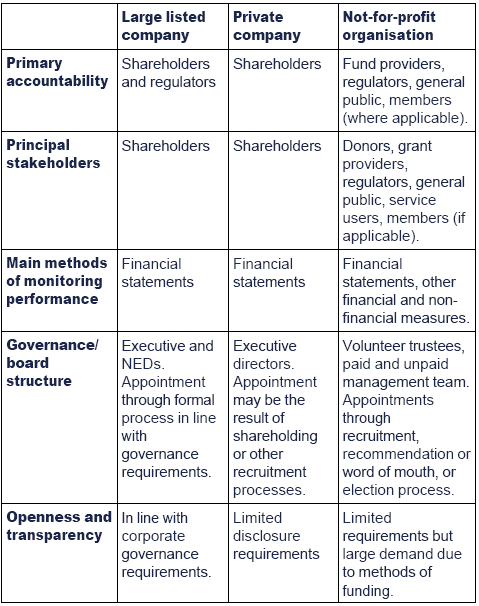
- Corporate governance is a matter of great importance for large public companies, where the separation of ownership from management is much wider than for small private companies.
- Public companies raise capital on the stock markets, and institutional investors hold vast portfolios of shares and other investments. Investors need to know that their money is reasonably safe.
- Should there be any doubts about the integrity or intentions of the individuals in charge of a public company, the value of the company's shares will be affected and the company will have difficulty raising any new capital should it wish to do so.
- The scope of corporate governance for private and not-for-profit organisations will be much reduced when compared with a listed company, especially as there are no legal or regulatory requirements to comply with.
- The ownership and control, organisational objectives, risks and therefore focus may be different from a listed company. However, many of the governance principles will still be applicable to other entities.
- The public and not-for-profit sectors have voluntary best practice guidelines for governance which, while appreciating the differences in organisation and objective, cover many of the same topics (composition of governing bodies, accountability, risk management, transparency, etc.) included within the UK Corporate Governance Code (2010).
- In not-for-profit organisations, a key governance focus will be to demonstrate to existing and potential fund providers that money is being spent in an appropriate manner, in line with the organisations' objectives.
Internal corporate governance stakeholders
Within an organisation there are a number of internal parties involved in corporate governance. These parties can be referred to as internal stakeholders.
A useful definition of a stakeholder, for use at this point, is 'any person or group that can affect or be affected by the policies or activities of an organisation'.
Each internal stakeholder has:
- an operational role within the company
- a role in the corporate governance of the company
- a number of interests in the company (referred to as the stakeholder 'claim').
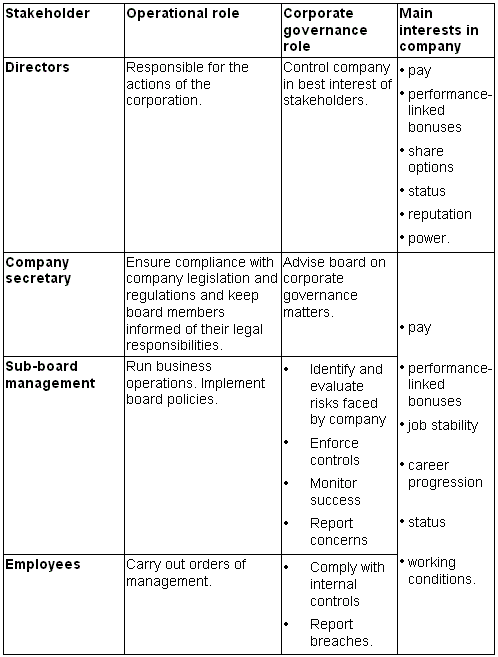
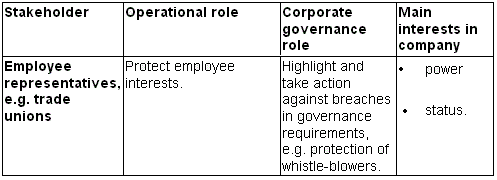
External corporate governance stakeholders
A company has many external stakeholders involved in corporate governance.
Each stakeholder has:
- a role to play in influencing the operation of the company
- its own interests and claims in the company.
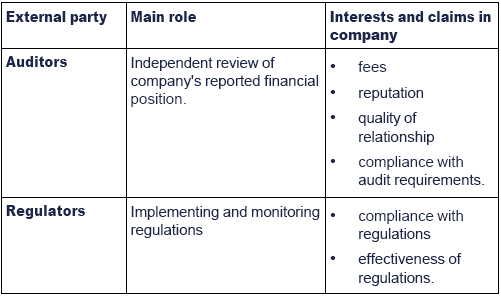

|
Created at 8/15/2012 10:13 AM by System Account
(GMT) Greenwich Mean Time : Dublin, Edinburgh, Lisbon, London
|
Last modified at 4/26/2013 2:59 PM by System Account
(GMT) Greenwich Mean Time : Dublin, Edinburgh, Lisbon, London
|
|
|
|
 |
Rating
:
|
 Ratings & Comments
(Click the stars to rate the page) Ratings & Comments
(Click the stars to rate the page)
|
 |
Tags:
|
|